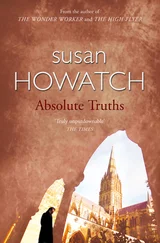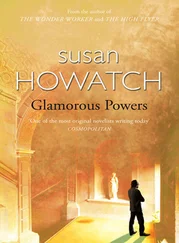By a mighty effort I recovered myself sufficiently to say: ‘I’m glad my efforts met with your approval, my Lord.’
‘Well, as soon as I’d read the letters I said to my wife: “I must hear this man preach!” I look forward immensely to your sermon tomorrow – and little Dido, I might add, is in a veritable fever of anticipation.’ The Earl sighed with pleasure, though whether at the thought of my sermon or of ‘little Dido’ it was impossible to discern. ‘There’s a heart of gold underneath all that flashy behaviour,’ he confided, ‘and I’m delighted she’s become more serious lately. I suspect she’s been very unhappy. London society’s an awful business. I’m glad my daughters married quickly and didn’t have to rattle about for too long … Now tell me this, Archdeacon: do you think little Dido should marry into the Church? You may not have realized this, but she’s set her heart on it –’ That was when I finally dared to believe that Dido had been highly selective in her choice of letters ‘– and to be honest I can’t quite see her in a vicarage. I don’t think she realizes how old-fashioned the Church is in so many ways and how conventional her behaviour would have to become. She’d be better off with a land-owning politician, I think – someone who has a house in London and a few hundred acres somewhere in hunting country.’
‘Possibly so.’ A still small voice was now busy whispering in my mind that with Dido at my side no ecclesiastical prize would be unobtainable, but I knew very well that this voice came not from God but from the force which old-fashioned churchmen called the Devil and which I, as a good Modernist, recognized as the dark side of my ego. I have no wish to make excuses for the dark side of my ego, but perhaps I might be permitted to attempt to justify the desire to do as well as I possibly could in my career – the desire which my critics would unhesitatingly label as an ambition quite unbecoming to a clergyman.
Ambition, like everything else in one’s life, must be dedicated to the service of God. When I dreamed of preferment I had no wish merely to serve myself; I only wanted to get into a position where I could serve God to the very best of my God-given ability, and the truth was that my God-given ability was not for living on locusts and wild honey as a holy man in the wilderness. My talent was for administration. My archdeaconry ran like clockwork. My curates were trained, groomed and buffed to a high lustre. I had only to cast an eye on any diocesan department and bureaucratic slovenliness instantly evaporated. I could put the Bishop through his paces so painlessly that he ceased to be depressed by paperwork.
Now, I’m willing enough to admit that this gift of mine is not spiritually exciting, but I submit, with all due respect, that not every clergyman is born to be a St Francis of Assisi or a St Ignatius Loyola. My duty was not to waste time bemoaning my limitations, but to dedicate my gift, modest as it was, to God’s service. Am I deceiving myself when I speculate that God was probably glad to receive it even though it was sadly lacking in spiritual glamour? I think not. After all, someone has to run the Church of England, that historic witness to the power of the Christian faith, and since in an imperfect world a Church can hardly thrive on a diet of undiluted holiness, first-class administrators must always be essential for its welfare.
In short, I felt I could justify my ambition to travel upwards in the ecclesiastical hierarchy. What I could never justify was a desire to travel that road in the company of a woman who wasn’t my wife. That was utterly reprehensible and no good clergyman would ever allow himself to sink so low – a statement which was the equivalent of saying the thought had never occurred to me because I was such a good clergyman. Wiping it from my mind with shame I resolved to forego the pleasure of making love to my wife beneath an earl’s roof that night and instead spend time polishing my sermon.
Alex had once advised me that a clergyman addressing the upper classes from the pulpit should never forget that they had received, no matter how unwillingly, a good education; he had recommended including at least one well-known quotation at the start of the sermon, as they would feel clever when they recognized the words and this self-satisfaction would put them in a benign, receptive mood. Accordingly when writing the sermon I had begun with a quotation from Browning (‘How very hard it is to be a Christian!’), glided into Tennyson (‘Ring out the darkness of the land; ring in the Christ that is to be’), brushed against T. S. Eliot (‘Each venture is a new beginning’), and bound all these lines together with one of my favourite biblical texts: ‘Jesus Christ is the same yesterday, today, yea and forever,’ – words which I always felt offered comfort, particularly in an unstable, war-torn world.
Starmouth Court stood in the parish of Leatherhead, a pleasant country town not far from the outer reaches of the South London suburbs, and the fine Norman church overlooked the valley of the River Mole, so called for its habit of burrowing underground in unexpected places. I wondered if the vicar minded when his distinguished parishioners imposed guest-preachers on him, but when he greeted me with unflinching cordiality I deduced he was more than ready to welcome a holiday from homiletics. The service began. The moment for the sermon arrived, and without wishing to brag I must confess that I made the most of my golden opportunity.
It was after lunch when I was cornered by Lady Starmouth. Having discovered that afternoon rests were permitted to guests, Grace had slipped away to our room in order to drum up some extra stamina and I had wandered outside for a stroll in the grounds. I wound up prowling aimlessly from terrace to terrace as I tried to pretend I had no desire to bump into Dido.
‘Archdeacon! Just the man I wanted to see,’ exclaimed my hostess, eventually ensnaring me as I loafed around the rose garden’s wishing-well. ‘Let’s sit down for a moment. I want to talk to you about Dido.’
‘Ah!’ I said. The monosyllable might have seemed unadventurous but at least it had the merit of being uncontroversial. I allowed myself to be steered to an elegant wrought-iron seat which overlooked a bed of oppressively feminine red roses.
‘I really must congratulate you, Mr Aysgarth,’ said Lady Starmouth, dark eyes very friendly, and bestowed upon me one of her most gracious smiles.
‘Oh?’ I said, dumb as any uncouth Yorkshire yokel. In panic I ordered myself to abandon these absurd monosyllables.
‘Come now, Archdeacon!’ said Lady Starmouth, effortlessly charming, subtly grand. ‘Don’t pretend you don’t know what I’m talking about! Of course you’re well aware that Dido’s in love with you, and of course you realize that I’m congratulating you on your skill in dealing with her infatuation.’
‘Ah!’ I said again. No wonder Yorkshiremen had a dour reputation. All I needed to complete my imitation of the wooden-headed provincial northerner was a cloth cap. Furious with myself for being so crippled by shyness I cursed the entire English class system and tried to pretend my hostess was merely one of my middle-class parishioners.
‘I’m not sure I entirely agree with your diagnosis of Dido’s feelings, Lady Starmouth,’ I said, somehow producing a casual smile, the kind of smile a clever clergyman produces when he’s talking of worldly matters to a sophisticated older woman. ‘She’s not in love with me. She’s in love with what I represent.’
‘That’s a shrewd remark and confirms my opinion that you’re no fool. But Archdeacon, I think it’s time someone helped you by throwing a little extra light on what could prove to be an inflammable situation. The truth is, I’m afraid, that Dido’s a very naughty little girl. Oh, I concede there are extenuating circumstances – the father’s a rogue, the mother’s unpresentable, new money always produces vulgar consequences – but nevertheless one can’t escape the fact that the Tallent children were thrown into society with only hired old crones to chaperone them, and since those three girls had no education, no breeding, no proper childhood discipline and no real inkling of how they should conduct themselves, it’s hardly surprising that their social successes – based, I may say, entirely on their ability to flirt – should have resulted in scandal and tragedy. Dido’s told you the whole sad story, I presume?’
Читать дальше


![W. R. Chambers Ltd. - W. & R. Chambers's Books, Suitable for Prizes and Presentation [1892]](/books/571823/w-r-chambers-ltd-w-r-chambers-s-books-suit-thumb.webp)









